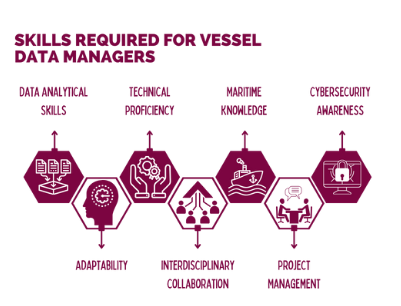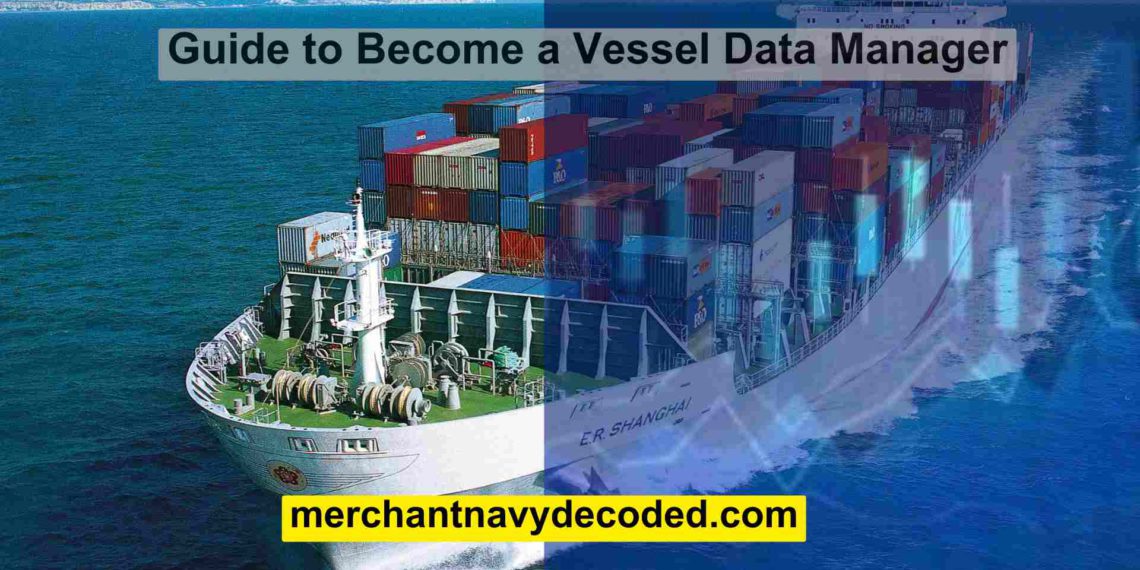How to Become a Vessel Data Manager
Overview
- Explore the critical role of Vessel Data Managers in the maritime industry.
- Discover the essential skills required for success in this field, from data analytics to advanced software proficiency.
- Learn that this career isn’t limited to a specific engineering role, making it accessible to a broader talent pool.
- Explore the promising career opportunities, with a focus on salary expectations and growth potential.
- Uncover the diverse locations in India where Vessel Data Management opportunities exist.
- Find out where to apply, from ship management companies to survey firms and the expanding horizons of commercial companies.
What Is Vessel Data and its Importance?
Vessel Data Overview:
- Vessel data refers to the information collected from ships, such as cargo ships, container vessels, and oil tankers.
- This data encompasses details like the ship’s location, speed, fuel consumption, weather conditions, cargo status, and engine performance.
Importance in Maritime Operations:
- Vessel data is vital for safe and efficient maritime operations, helping ships navigate, avoid collisions, and make informed decisions.
- It also aids in optimizing fuel consumption, predicting maintenance needs, and responding to emergencies.
Data Management:
- Managing vessel data involves collecting, processing, and storing this information using various sensors and technology on the ship.
- Effective data management enhances safety and operational efficiency in the marine industry.
What Is a Vessel Data Manager?
A Vessel Data Manager, sometimes referred to as a Voyage Data Manager, plays a vital role in processing data that facilitates predictive analysis. This data can come from various sources, including sensors like vibration capture sensors, Fuel Consumption Sensors, etc.
Example- Vibration Capture Sensor:
Vibration capture sensors are used on ships to monitor and record vibrations. This data is valuable because it can help identify potential issues with the ship’s machinery or structure. The Vessel Data Manager processes this information for analysis.
Opportunities in Vessel Data Management

Presently, only about 5 to 7 percent of ships are equipped with advanced sensors and data management systems. Implementing data-driven systems can lead to substantial cost savings in the maritime industry. Predictive analysis helps prevent breakdowns, reducing expenses related to repairs and spare parts.
Regulatory Compliance
Maritime regulations are becoming more stringent. Vessel Data Management can help companies comply with environmental and safety regulations, avoiding fines and penalties.
Safety and Efficiency
Data-driven decision-making enhances both the safety and efficiency of vessel operations. This is a top priority for shipping companies.
Environmental Concerns
With a growing focus on reducing the environmental impact of shipping, data management can lead to greener practices, appealing to environmentally conscious customers and regulators.
Diverse Applications
The applications of data management in the maritime industry are diverse, ranging from engine performance optimization to cargo security.
Potential for Innovation
The field is ripe for innovation, with ongoing advancements in technology and data analytics.
Market Growth
- The maritime industry is continually expanding, with an increasing need for efficient, data-driven solutions. As the market grows, so do the opportunities for Vessel Data Managers.
- In today’s world, with only a small percentage of ships utilizing these advanced sensors and data management systems, the potential for growth and career opportunities in Vessel Data Management is substantial. As more companies recognize the benefits of these technologies, the demand for professionals in this field is poised to increase significantly.
Skills Required for Vessel Data Managers
Data Analytical Skills
Vessel Data Managers need a strong foundation in data analytics. This includes the ability to process, clean, and interpret data to extract meaningful insights. Proficiency in statistical analysis and data visualization is crucial.
Technical Proficiency
Vessel Data Managers must be technically proficient in various tools and technologies, including:
- Advanced Excel: Proficiency in Excel for data analysis and reporting.
- Programming Languages: Familiarity with programming languages such as Python, C, C++, etc. for data manipulation and analysis.
- AI Tools: Understanding and working with artificial intelligence and machine learning tools to develop predictive models.
Maritime Knowledge
A fundamental understanding of the maritime industry is vital. This includes knowledge of ship operations, maritime regulations, and safety protocols. This industry-specific knowledge allows Vessel Data Managers to contextualize data and make informed decisions.
Cybersecurity Awareness
Data security is a significant concern in the maritime industry, as sensitive information is collected and transmitted. Vessel Data Managers should be aware of cybersecurity best practices to protect data from unauthorized access and cyber threats.
Adaptability
The field of data management is continually evolving. Vessel Data Managers should be open to learning and adapting to new technologies, tools, and best practices as they emerge in the maritime industry.
Interdisciplinary Collaboration
The role often involves working with a diverse team of professionals, including engineers, software developers, and maritime experts. Collaboration and the ability to bridge the gap between technical and maritime personnel are essential.
Project Management
Vessel Data Managers may oversee data-related projects, requiring project management skills to ensure tasks are completed on time and within budget.
Salary Expectations for Vessel Data Managers

Operational Level Engineers (3E and 4E)
- Starting Salary Range: Operational-level engineers with the required data management skills can expect to start with a competitive salary. In India, this range typically begins at approximately 12 to 20 lakhs per year.
- Factors Influencing Salary: The salary for operational-level engineers in Vessel Data Management can vary depending on factors such as their experience, the specific employer, and the location of the job. Engineers with more years of experience may command higher salaries.
- Benefits and Growth: Beyond the base salary, operational-level engineers may also receive benefits such as bonuses and additional perks. As they gain more experience in the field, they can expect salary growth.
Management Level Engineers (2E and Chief Engineers)

- Starting Salary Range: Management-level engineers who transition to shore jobs and possess the skills required for Vessel Data Management often start at a higher salary level. In India, this range typically begins at around 24 lakhs per year.
- Experience Matters: Just like operational-level engineers, experience plays a significant role in salary determination. Management-level engineers with a substantial track record in the maritime industry may command even higher salaries.
- Additional Benefits: Management-level engineers may also receive additional benefits, performance bonuses, and other perks, especially if they hold supervisory or leadership positions within the data management team.
- Career Advancement: As they continue their careers in data management, management-level engineers have opportunities for career advancement, which can lead to increased responsibilities and, consequently, higher compensation.
Locations & Where to Apply
Metropolitan Areas in India
Major metropolitan areas in India, such as Mumbai, Chennai, Kolkata, and Delhi, are hotspots for the maritime industry. Here, you can find numerous job opportunities for Vessel Data Managers due to the concentration of shipping companies, ports, and maritime-related businesses.
Port Cities
Port cities across India, including Mumbai, Chennai, and Visakhapatnam, offer a wealth of opportunities. These cities are hubs for maritime activities, making them prime locations for Vessel Data Manager positions.
Maritime Clusters
Some regions, like Gujarat’s GIFT City (Gujarat International Finance Tec-City) and Haldia, have been designated as maritime clusters, fostering maritime-related activities. These areas often have a high demand for data management professionals.
Shipping and Ship Management Companies
When looking for job opportunities, start by exploring shipping and ship management companies. These organizations require Vessel Data Managers to ensure the smooth operation of their vessels and to meet regulatory compliance.
Specific Survey Companies
Survey companies play a crucial role in inspecting and assessing the condition of ships and cargo. They often employ Vessel Data Managers to analyze data collected during surveys.
Maritime Technology Firms
Companies specializing in maritime technology, including data analytics and sensor technology, are in constant need of professionals who can manage and analyze vessel data. These firms offer opportunities for Vessel Data Managers to work on cutting-edge solutions.
Commercial Companies with Maritime Interests
Over time, various commercial companies with an interest in maritime operations may recognize the importance of data management. They could hire Vessel Data Managers to help them make data-driven decisions and optimize their shipping and logistics operations.
What to Expect as a Vessel Data Manager

Data-Driven Decision-Making
- Optimizing Operations: Your primary responsibility is to use data to optimize and streamline maritime operations. This means making informed decisions to enhance efficiency, safety, and cost-effectiveness in vessel management.
- Real-Time Insights: You’ll have the opportunity to work with real-time data, allowing you to quickly respond to emerging challenges and opportunities. This fast-paced decision-making contributes to the overall success of shipping operations
Problem-Solving
- Complex Challenges: Maritime data often presents complex challenges. Your ability to use data analysis to identify issues, such as machinery failures or safety concerns, and devise effective solutions is at the core of your role.
- Continuous Improvement: As a problem solver, you’ll contribute to a culture of continuous improvement in the maritime industry. By addressing and resolving issues proactively, you play a crucial role in enhancing overall efficiency and safety.
Strong Industry Relevance
- Adapting to Modern Demands: The maritime industry is adapting to modern demands, including environmental regulations, safety standards, and digitalization. Vessel Data Managers are at the forefront of this transformation, ensuring the industry remains competitive and sustainable.
- Key Industry Players: Your role holds strong relevance as major players in the maritime sector increasingly recognize the importance of data-driven decision-making. Your expertise positions you as a valuable asset in this evolving industry.
Rewarding Career
Tangible Impact: A career as a Vessel Data Manager offers the satisfaction of making a tangible impact. Your work contributes to the safety of seafarers, the reliability of shipping operations, and the overall success of the maritime industry, making it personally rewarding.
Professional Growth: The maritime industry is ever-evolving, providing ongoing opportunities for professional growth. As you gain experience and expertise in data management, you can advance your career and take on more significant roles within the industry, further enhancing the rewarding nature of your work.
Conclusion
In conclusion, being a Vessel Data Manager in the maritime industry is an exciting and important job. You get to work with data from ships, making sure they run smoothly and safely. You need skills like data analysis, technical know-how, and knowledge of the maritime world. The job has good career prospects and can be found in places like big cities, port towns, and maritime clusters. As a Vessel Data Manager, you’ll use data to solve problems and help the shipping industry become better. It’s a rewarding career with room for growth, and it’s worth considering if you’re interested in both technology and the sea.
Disclaimer :- The opinions expressed in this article belong solely to the author and may not necessarily reflect those of Merchant Navy Decoded. We cannot guarantee the accuracy of the information provided and disclaim any responsibility for it. Data and visuals used are sourced from publicly available information and may not be authenticated by any regulatory body. Reviews and comments appearing on our blogs represent the opinions of individuals and do not necessarily reflect the views of Merchant Navy Decoded. We are not responsible for any loss or damage resulting from reliance on these reviews or comments.
Reproduction, copying, sharing, or use of the article or images in any form is strictly prohibited without prior permission from both the author and Merchant Navy Decoded.


